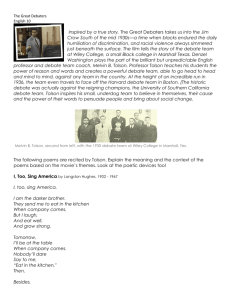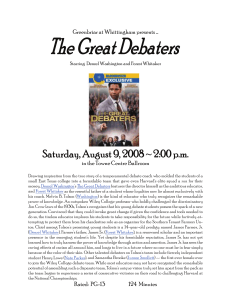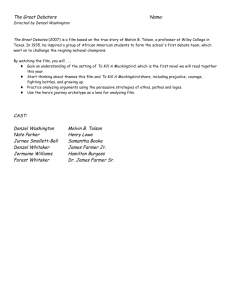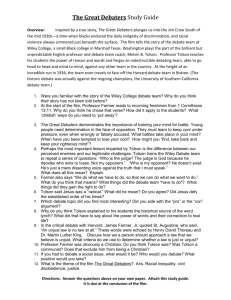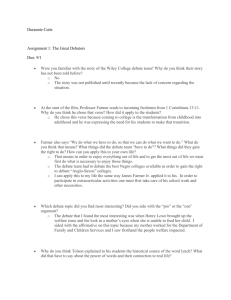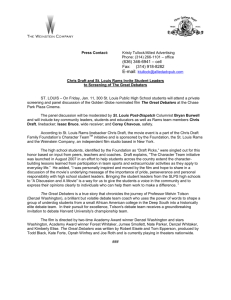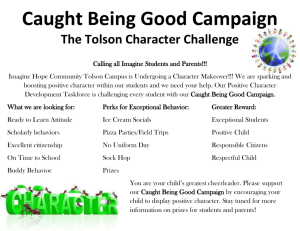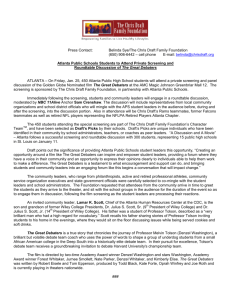The Great Debaters
advertisement
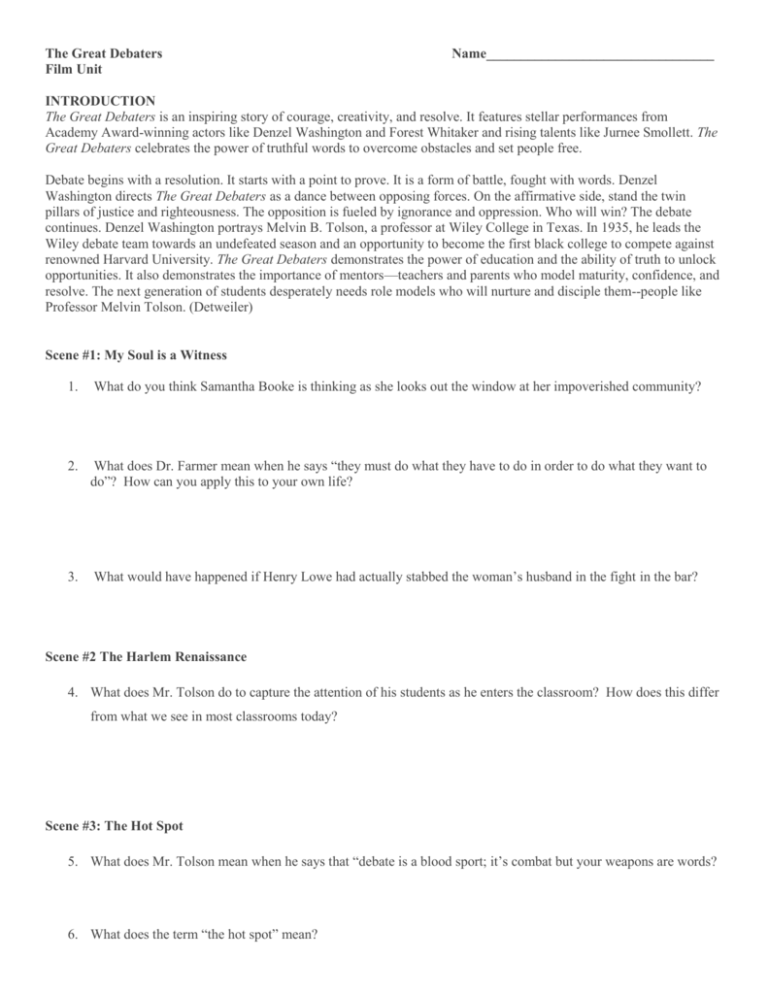
The Great Debaters Film Unit Name_________________________________ INTRODUCTION The Great Debaters is an inspiring story of courage, creativity, and resolve. It features stellar performances from Academy Award-winning actors like Denzel Washington and Forest Whitaker and rising talents like Jurnee Smollett. The Great Debaters celebrates the power of truthful words to overcome obstacles and set people free. Debate begins with a resolution. It starts with a point to prove. It is a form of battle, fought with words. Denzel Washington directs The Great Debaters as a dance between opposing forces. On the affirmative side, stand the twin pillars of justice and righteousness. The opposition is fueled by ignorance and oppression. Who will win? The debate continues. Denzel Washington portrays Melvin B. Tolson, a professor at Wiley College in Texas. In 1935, he leads the Wiley debate team towards an undefeated season and an opportunity to become the first black college to compete against renowned Harvard University. The Great Debaters demonstrates the power of education and the ability of truth to unlock opportunities. It also demonstrates the importance of mentors—teachers and parents who model maturity, confidence, and resolve. The next generation of students desperately needs role models who will nurture and disciple them--people like Professor Melvin Tolson. (Detweiler) Scene #1: My Soul is a Witness 1. What do you think Samantha Booke is thinking as she looks out the window at her impoverished community? 2. What does Dr. Farmer mean when he says “they must do what they have to do in order to do what they want to do”? How can you apply this to your own life? 3. What would have happened if Henry Lowe had actually stabbed the woman’s husband in the fight in the bar? Scene #2 The Harlem Renaissance 4. What does Mr. Tolson do to capture the attention of his students as he enters the classroom? How does this differ from what we see in most classrooms today? Scene #3: The Hot Spot 5. What does Mr. Tolson mean when he says that “debate is a blood sport; it’s combat but your weapons are words? 6. What does the term “the hot spot” mean? 7. How does Samantha’s source, “the look in a mothers eye when she can’t feed her kids” represent an insight that a male student may not have? Scene #4: Melvin Tolson’s Debate Team 8. What does Tolson mean when he says, “Black is always equated with failure. Well write your own dictionary”? Scene #5: The Pig Farmer 9. Why does the pig farmer refer to the Dr. Farmer as “boy”? 10. What do you think both sets of children are learning from observing this conflict? 11. Discuss how poor Whites still had privileges over wealthier, professional Blacks. How does this relate to our study of To Kill a Mockingbird and Mississippi Burning? ONE PARAGRAPH REQUIRED. __________________________________________________________________________________________________ __________________________________________________________________________________________________ __________________________________________________________________________________________________ __________________________________________________________________________________________________ __________________________________________________________________________________________________ __________________________________________________________________________________________________ __________________________________________________________________________________________________ __________________________________________________________________________________________________ __________________________________________________________________________________________________ __________________________________________________________________________________________________ __________________________________________________________________________________________________ Scene #6: Debate Training 12. Why does Tolson feel it is important to tell Henry Lowe about Willie Lynch? Scene #7: Tolson, The Labor Organizer 13. What was Tolson doing with the farmers? 14. What fears did the farmers have? Scene #8: The Dinner Table 15. What did the debaters have to debate at an off campus site? Scene #9: Debating Oklahoma State University 16. “The time for justice, the time for freedom, the time for equality is always right now.” What does this mean? Is this statement still relevant today as we think about issues of inequality? Scene #10: Melvin Tolson and James Farmer Sr. 17. When Samantha says, “I didn’t need a gun, I didn’t need a knife” what is she speaking about? Scene #11: Tolson Gets Arrested 18. How does Dr. Farmer redeem himself in the eyes of his son? 19. Why is the sheriff forced to let Tolson go? Scene #12: Lynching 20. How does Henry Lowe cope with his pain and anger after witnessing the lynching? 21. Why is Lowe so hurt with Farmer says “this is all useless”? Scene #13: An Invitation to Debate Harvard 22. Why do you think debating Harvard is so important to Tolson? 23. Why is Tolson unable to go to Harvard with the debaters? Scene #14: Change of Debate Topic 24. Why was the debate topic changed? Scene #15: Harvard Debate 25. How does James Farmer Jr.’s argument surrounding the lynching negro’s in Texas leave very little room for debate?
